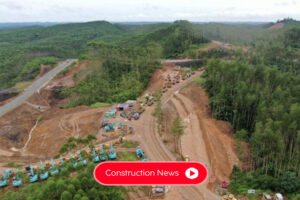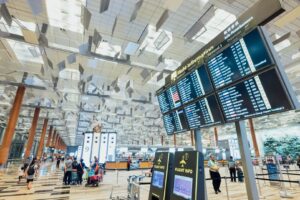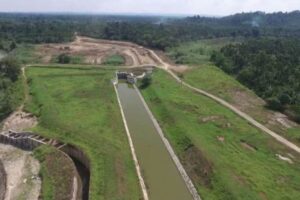
The Industry Ministry proposes to develop 19 priority industrial estates outside Java from 2020 to 2024. The plan is included in the 2020 – 2024 National Medium-Term Development Plan (RPJMN). The development of new industrial estates is expected to increase investments in the industrial sector. Hence, national economic growth will also be boosted.
“The strategic measure is in line with Law Number 3 of 2014 on Industry, as industries must be located in industrial estates,” Industry Minister Agus Gumiwang Kartasasmita said at a dialog on priority industrial estate development in Jakarta on Tuesday (10/13).
The 19 priority industrial estates are Sei Mangkei in Simalungun (North Sumatra), Kuala Tanjung in Batubara (North Sumatra), Galang Batang in Bintan (Riau Islands), Bintan Aeorospace Industry in Bintan (Riau Islands), Kemingking in Muaro Jambi (Jambi), Tanjung Enim in Muara Enim (South Sumatra), Pesawaran in Pesawaran (Lampung), Way Pisang in Way Pisang (Lampung), Sadai in Bangka Selatan (Bangka Belitung), Ketapang in Ketapang (West Kalimantan), and Surya Borneo in Kotawaringin Barat (Central Kalimantan).
Then, there are also Buluminung in Penajem Paser Utara (East Kalimantan), Tananh Kuning in Bulungan (North Kalimantan), Batulicin in Tanah Bumbu (Kalimantan Selatan), Jorong in Tanah Laut (South Kalimantan), Bengkalan in Madura (East Java), Weda Bay in Halmahera Tengah (North Maluku), Palu in Palu (Central Sulawesi), and Bintuni in Bintuni Bay (West Papua).
“The priority industrial estate constructions from 2020 to 2024 will focus on industrial development that is based on agro[nomy], natural oil and minerals, metal, coal, as well as high-tech and aerospace industries,” the Industry Minister said.
According to Agus, proposal for the 19 industrial estates have passed several selections which assessed various aspects of the proposal. In this case, the Industry Ministry has a list of industrial estates that will be built throughout Indonesia, including industrial estates that are in licensing, land acquisition, or construction process.
“From the list, we will select [the industrial estates] by observing their progress and each of their problems, then we will assess them using the technical criteria for priority industrial estates. The technical criteria are administration criteria which include industrial estate licence status, land ownership, and spatial planning compliance,” the Industry Minister said.
He added that the operational criteria include management type, funding capability, tenants, strategic value of the industrial estate that would be built, regional development potential, as well as future government intervention potential.
The Industry Minister admitted that there were numerous challenges that must be overcome to develop new industrial estates, from preparing documents, land and spatial planning, licenses, infrastructures, management, tenants, as well as future business convenience.
Hence, to accelerate the 19 industrial estate constructions, cooperation with the regional government where the industrial estate is located is required. This passion must be supported by a commitment from industrial estate operators that are actively preparing licences, infrastructures, marketing, and operation of industrial estates.
The Industry Ministry revealed that there were currently 103 operational industrial estates that reached up to 55 thousand hectares (ha) in size. Meanwhile, there are 15 industrial estates in construction and 10 industrial estates in planning.
“Out of the 103 operational industrial estates, 58 of them are in Java, while 33 are in Sumatra, 8 are in Kalimantan, and 4 are in Sulawesi. Since 2014, there are 20 new industrial estates,” he said.
He said that the industrial estates were being constructed to follow the directions of President Joko Widodo, who asked for the development of industrial estates throughout Indonesia. There is an increase of industrial estates by 28.15%.
Agus affirmed that the government intended to create a conducive investment climate to boost industrial estate growth. This can convince potential investors that business in the industrial sector of Indonesia is still prospective.
“Hence, comprehensive policies from the government are required, both fiscal and non-fiscal incentives. The policies will surely make things easier. We appreciate several regional governments that proposed industrial estates to be built in their region,” he said.
Besides that, he added that the government had developed industrial estates outside of Java to boost inclusive economic equality to realise Indonesia-centric development.
He explained industrial estates in Java would be focused on the development of high-tech industry, labour intensive industry, and industry which consumed low amount of water. Industrial estates outside Java are more focused on industries based of natural resources, logistics system efficiency improvement, and development of industrial estates to become new economic centres.
“Development of these new economic centres must be integrated with regional development, which includes infrastructure construction to support the development of regional economy,” he said.
Until now, he assessed that industrialisation would provide a wide multiplier effect for the national economy, starting with domestic raw material value increase, local workforce absorption, as well as foreign exchange revenue from exports.
The Industry Minister recorded that, from 2015 to the second half of 2019, investments in the industrial sector reached Rp1,173.5 trillion. During the period, the largest investors are metal, machinery, and electronics industries that reached Rp266.13 trillion, followed by the food industry that reached Rp257.47 trillion.
He said that chemical and pharmaceutical industries contributed Rp217 trillion, mineral and the non-metal industries contributed Rp98.75 trillion, and automotive industry contributed Rp96.7 trillion.
The Industry Minister said that construction of industrial estates outside Java had been carried out from the previous period. In 2015-2019 RPJMN, the government boosted 14 priority industrial estates outside Java.
The Industry Minister said that, after the issuance of Presidential Regulation on Strategic National Projects, the government had boosted 24 industrial estates until 2019.
Kindly fill in the form below, our consultant will get in touch as soonest.
Alternatively, you can call at +62 815 629 0000 (whatsupp available) or email to info@bizindo.com




 20% off today. Whatsapp us!
20% off today. Whatsapp us!